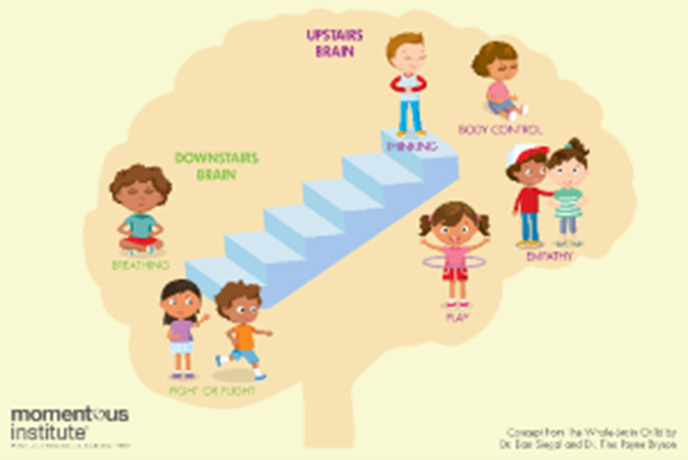Moving with our Emotions
Moving with our Emotions
During this term in assemblies, we have continued exploring relationships and how we individually deal with what is in and out of our control. Dealing with others is something that as humans, we are programmed to engage in. In fact, we cannot live without it. However, from a slight disagreement to a breakdown in relationships, all of us, from time to time, will need to manage the associated emotions that come with such occurrences.
Managing emotions and recognising heat moments greatly affect how the brain processes different situations. Perhaps the easiest way to explain this is by using the analogy of an upstairs and a downstairs brain, something we have spent considerable time on over the last few weeks.
 The downstairs brain includes lower regions of the brain responsible for basic functions (like breathing and blinking) as well as impulses and emotions (like anger and fear). The upstairs brain is responsible for more intricate mental processes like planning, decision-making, self-awareness, empathy and morality. When a child’s upstairs brain is functioning well, they are more likely to slow down, think before they act, regulate emotions, self-soothe and consider others’ feelings and perspectives — all important areas of healthy human functioning.
The downstairs brain includes lower regions of the brain responsible for basic functions (like breathing and blinking) as well as impulses and emotions (like anger and fear). The upstairs brain is responsible for more intricate mental processes like planning, decision-making, self-awareness, empathy and morality. When a child’s upstairs brain is functioning well, they are more likely to slow down, think before they act, regulate emotions, self-soothe and consider others’ feelings and perspectives — all important areas of healthy human functioning.
When the upstairs and downstairs brains lose contact, we name this “flipping our lid”. We have momentarily lost contact with the rational part of our brain and big emotions are released.
While the downstairs brain with its strong emotions and impulses is fully built and functioning in young children, the upstairs brain is unfinished and is still under construction well into a person’s twenties. Our job as adults in children’s lives is to support the integration of the downstairs and upstairs regions of students’ brains.
Outdoor Education, Gawun and the Year 5 Leaders
As leaders of the Junior College, our Year Five cohort have had the opportunity to attend their Outdoor Education Program this week. Students learnt concepts around leadership, group dynamics and their agency to help and serve others. As leaders of our Junior College, students are responsible for growing their leadership skills to benefit themselves and others.
In addition to the Outdoor Education Program, Year Five Students participated in a series of leadership activities on the last day of the program. One of the core concepts involved in the Pacific Way is one of service to self and others. The leadership day allowed students to reflect and collaborate to develop a series of service-learning opportunities to enhance the culture and provide our student leaders with tangible opportunities. It also provided a reflection space around how students can hold themselves to the values their families and college promote.
This land’s traditional custodians, the Gubbi Gubbi people, have a name for care or care for, Gawun. It is hoped that our Year 5 leaders can exhibit ‘Gawun’ for our College community and grow as leaders and people through a concentrated focus. You may have noticed our Year Five leaders moving among our Junior College and adding a level of guidance to the younger students in the classroom and our play spaces.
Our plan involves building on the work established by previous cohorts and identifying critical areas within the Junior College that would benefit from additional support. Through further discussion, we hope to move to house-based leadership activities that create a pathway for our students to flow into leadership opportunities that exist in Middle and Senior College.
Our students and teaching staff have been involved in the process from the start, and it has been wonderful to see agency and teamwork in action. We thank Mr Paul Brace, Head of Outdoor Education, for planning and coordinating this experience and the many staff that attended the program and allowed the students to be involved in such a rich learning opportunity.
Opportunity for a free e-safety webinar
eSafety's free webinars provide parents and carers with the knowledge, skills and tools to support their children to have safe, positive online experiences.
Their live webinars for parents and carers attracted record attendance numbers in 2022. To meet the growing demand, we are expanding the program in 2023 to include more dates and topics to support school communities.
Please register at https://www.esafety.gov.au/parents/webinars
Easter break
As we close out the term, I would like to take the opportunity to thank you, the wider community for the support offered to the children in your care and the new and continued partnerships you have formed with the staff here at Pacific. I wish you a relaxing break and a Holy Easter.
Take care and God Bless.
Mr Damian Davis, Head of Staff and Students P-5
